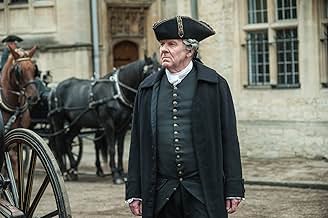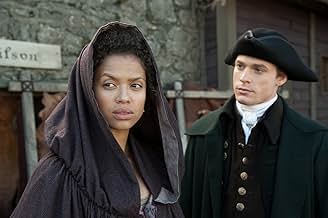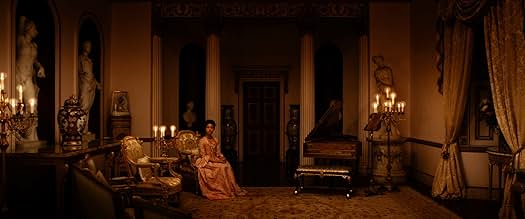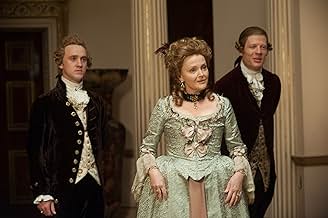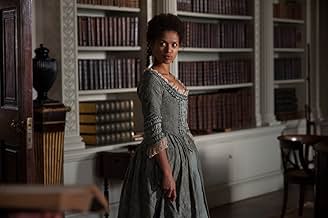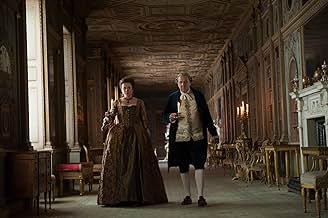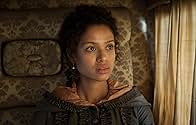A filha do capitão da Marinha Real Sir John Lindsay, Dido Elizabeth Belle, é criada por seu aristocrático tio-avô Lord William Murray, o primeiro Conde de Mansfield na Inglaterra do século X... Ler tudoA filha do capitão da Marinha Real Sir John Lindsay, Dido Elizabeth Belle, é criada por seu aristocrático tio-avô Lord William Murray, o primeiro Conde de Mansfield na Inglaterra do século XVIII.A filha do capitão da Marinha Real Sir John Lindsay, Dido Elizabeth Belle, é criada por seu aristocrático tio-avô Lord William Murray, o primeiro Conde de Mansfield na Inglaterra do século XVIII.
- Prêmios
- 13 vitórias e 32 indicações no total
Avaliações em destaque
10dediggs
This movie is most likely not playing at a theater near you, but it is so worth traveling to see. The acting was superb! I don't remember a movie in recent times that I enjoyed so much. The story touched my heart as a person of mixed African descent. It showed how then and now too much emphasis is placed on skin color. It showcased people (both white and black) that were willing to stand up for what is right. I don't find this kind of movie to be controversial as it will do so much to enlighten people to historical facts that cannot be denied.
The costumes were so beautiful and some were on display at the Landmark Theater in Los Angeles. The audience clapped and cheered at the end of the movie and were raving about the movie as they left the theater.
The costumes were so beautiful and some were on display at the Landmark Theater in Los Angeles. The audience clapped and cheered at the end of the movie and were raving about the movie as they left the theater.
...that Peter Saunders must have been watching a different movie. I don't agree with him at all. I enjoyed this movie to the fullest. Though the ending was a bit predictable, the acting, sets (incredible), and story were wonderful. The costume designer should win an award...As well as the set designer. Don't let his review keep you from seeing this film. Watch it, enjoy it, and see for yourself if you like it. Seven bucks well spent. If you like period pieces, go see it. The sets alone are worth the trip. And the lead actress was both beautiful and played her role very well. Maybe there weren't enough explosions or CGI to make Peter happy...
In years hence, audiences will be able to point to this film, as the moment the world knew Gugu Mbatha-Raw was going to be big. Belle is Amma Asante's feature-length directorial debut, and her work here is astonishingly confident. Tackling a period piece may seem daunting to most, but in Asante's case, she has the benefit of a top-notch cast, and a truly fascinating story. Loosely based on the story of Dido Elizabeth Belle, Dido was the daughter of an enslaved African woman and an English admiral.
As the film begins, although she is born illegitimate, Dido's father (Matthew Goode, Stoker) gives her over into the care of his great-uncle, William Murray, the first Earl of Mansfield (Tom Wilkinson), who acts as the Lord Chief Justice of the British courts. As she grows into a young woman, Dido's life at the palatial estate of Kenwood is full of mixed blessings. While her uncle and aunt (Emily Watson, Breaking the Waves) treat her as if she were their own—they raise her alongside their other niece, Elizabeth Murray (Sarah Gadon, A Dangerous Method)—social conventions of eighteenth century society are immovable; no matter how much they love her, Dido feels the sting of being forced to eat with the servants, when company comes calling.
The greatness of the film comes in its intricate plotting, and in the parallels drawn between gender and race. Author Jane Austen dealt with the position of women in English society through the use of dry humor—though the rage at a young woman being forced into marriage in order to secure a safe future was always very much present. In Belle however, there is no satire to soften the blow. As Elizabeth comes out, venturing to London in search of a husband, she points out to Belle the inherent unfairness of a system that allows women to be treated as male property. Dido doesn't necessarily have the problem of a search for a husband, as the inheritance of her father's fortune ensures that she is financially secure; but for a radiant young woman in the prime of her life, her uncle's insistence on keeping her out of sight understandably rankles her.
Matters are complicated by the arrival of John Davinier (Sam Reid), the son of a local clergyman. Ambitious and wide-eyed, John wants to try to rise in station, training with Lord Mansfied to become a lawyer. His outspoken, radically abolitionist views on a notorious legal case Lord Mansfield is trying annoy the Lord considerably; but he rouses all the passionate feeling in Dido that she has been forced for so long to suppress.
As Lord Mansfield, Wilkinson (Batman Begins, Michael Clayton) plays the exasperated father figure with the correct touches of humor and warmth. As a judge, he projects the inner conflicts of a man with the weight of the entire economic system on his shoulders; you can see him try to deflect from the strong-arming of local politicians, who want to ensure that the presence of the "mulatto" in his house will not affect his ruling on the case. As Elizabeth, Gadon takes what could have been a very stereotypical role of the flighty, romantic English girl, and brings a deep sense of hurt to it. Having been left with her uncle after her new stepmother successfully wrote her out of her father's will, Elizabeth's cheery exterior hides an emotionally hurt young girl.
And finally, there is Mbatha-Raw. As Dido, the engine that drives the film, you may deeply feel her two-fold frustration as a woman, and as a person of color. You will be carried away by her passion—her belief that things should not remain the same. On a more general level, the camera absolutely adores her. She moves and projects with a vitality and ease that forces one to stop at several points. Her characterization and her performance are so accomplished, that her independent-minded heroine could stand toe-to-toe with the multiple incarnations of Jane Austen's Elizabeth Bennett. If Belle is any indication, and if there is any fairness in this world, there should be more great things to come from her.
-Nick Kostopoulos - See more at: http://www.mediumraretv.org
As the film begins, although she is born illegitimate, Dido's father (Matthew Goode, Stoker) gives her over into the care of his great-uncle, William Murray, the first Earl of Mansfield (Tom Wilkinson), who acts as the Lord Chief Justice of the British courts. As she grows into a young woman, Dido's life at the palatial estate of Kenwood is full of mixed blessings. While her uncle and aunt (Emily Watson, Breaking the Waves) treat her as if she were their own—they raise her alongside their other niece, Elizabeth Murray (Sarah Gadon, A Dangerous Method)—social conventions of eighteenth century society are immovable; no matter how much they love her, Dido feels the sting of being forced to eat with the servants, when company comes calling.
The greatness of the film comes in its intricate plotting, and in the parallels drawn between gender and race. Author Jane Austen dealt with the position of women in English society through the use of dry humor—though the rage at a young woman being forced into marriage in order to secure a safe future was always very much present. In Belle however, there is no satire to soften the blow. As Elizabeth comes out, venturing to London in search of a husband, she points out to Belle the inherent unfairness of a system that allows women to be treated as male property. Dido doesn't necessarily have the problem of a search for a husband, as the inheritance of her father's fortune ensures that she is financially secure; but for a radiant young woman in the prime of her life, her uncle's insistence on keeping her out of sight understandably rankles her.
Matters are complicated by the arrival of John Davinier (Sam Reid), the son of a local clergyman. Ambitious and wide-eyed, John wants to try to rise in station, training with Lord Mansfied to become a lawyer. His outspoken, radically abolitionist views on a notorious legal case Lord Mansfield is trying annoy the Lord considerably; but he rouses all the passionate feeling in Dido that she has been forced for so long to suppress.
As Lord Mansfield, Wilkinson (Batman Begins, Michael Clayton) plays the exasperated father figure with the correct touches of humor and warmth. As a judge, he projects the inner conflicts of a man with the weight of the entire economic system on his shoulders; you can see him try to deflect from the strong-arming of local politicians, who want to ensure that the presence of the "mulatto" in his house will not affect his ruling on the case. As Elizabeth, Gadon takes what could have been a very stereotypical role of the flighty, romantic English girl, and brings a deep sense of hurt to it. Having been left with her uncle after her new stepmother successfully wrote her out of her father's will, Elizabeth's cheery exterior hides an emotionally hurt young girl.
And finally, there is Mbatha-Raw. As Dido, the engine that drives the film, you may deeply feel her two-fold frustration as a woman, and as a person of color. You will be carried away by her passion—her belief that things should not remain the same. On a more general level, the camera absolutely adores her. She moves and projects with a vitality and ease that forces one to stop at several points. Her characterization and her performance are so accomplished, that her independent-minded heroine could stand toe-to-toe with the multiple incarnations of Jane Austen's Elizabeth Bennett. If Belle is any indication, and if there is any fairness in this world, there should be more great things to come from her.
-Nick Kostopoulos - See more at: http://www.mediumraretv.org
Although "Belle" tells a highly fictionalised account of her life, Dido Elizabeth Belle Lindsay was a real person. She was the illegitimate daughter of a British naval officer and a black slave. Unlike many children born in similar circumstances, however, she was fortunate in that her father acknowledged her and paid for her keep. When her mother died, her father brought her from the West Indies to England and entrusted her to the care of uncle, Lord Mansfield, who just happened to be the Lord Chief Justice. When her father died she inherited his fortune, making her a desirable heiress.
This is essentially a Jane Austen story, set a generation earlier and with a racial element thrown in. The film centres on Dido's emotional relationships. She is sought in marriage by Oliver Ashford, the younger son of an aristocratic family, but his interest is largely financial and the match is fiercely opposed by his mother and his elder brother, both of whom object to the idea of a mixed-race woman marrying into their family. The great love of her life is John Davinier, a clergyman's son, an aspiring lawyer and an ardent anti-slavery campaigner.
At her uncle's stately home Kenwood House, Dido is placed in a strange and anomalous position. By reason of her fortune she is an insider, part of England's establishment; Mansfield even worries that, because of the disparity in their financial positions she might be "marrying beneath herself" if she accepts John. Her race and her illegitimacy, however, make her an outsider. She is allowed to dine with the family when they are alone, but is forced to eat separately when they have guests who might be upset by the sight of a black face. Her position contrasts strangely with that of her cousin and close friend Lady Elizabeth Murray, another niece and ward of Lord Mansfield. Elizabeth is legitimate, but has no fortune of her own, having been virtually disowned by her father under the influence of his second wife. Yet because she is white there can be no question of Elizabeth having to dine apart from the family.
Set against the love of Dido and John is a subplot about what became known as the "Zong case". When sickness broke out on a slave ship, the captain ordered the crew to throw the slaves overboard. When the insurance company refused to compensate the ship-owners for their losses, the owners sued. Lord Mansfield was the judge who heard the case in the Court of King's Bench.
Tom Wilkinson has given a number of fine performances in recent British films (and sometimes in Hollywood too), and this is one of his best. In his dealings with Dido, whom he loves dearly, Mansfield is torn between his inner decency and the need to conform to the social proprieties of the period. In legal matters he is equally torn between the demands of the law and those of justice, which is not always the same thing. In the "Zong" case he is well aware that, in refusing to pay out on the policy the insurers are motivated by commercial considerations, not humanitarian ones; if they had any humanitarian feelings they would not have become involved in facilitating the slave trade in the first place. Nevertheless, he is equally well aware that a decision against the ship- owners will be seen as a victory for the growing anti-slavery movement and a step on the road to the abolition of the slave trade. Other good performances come from newcomer Gugu Mbatha-Raw in the leading role, Penelope Wilton as Lord Mansfield's sister and Sam Reid as John.
The film has something in common with "Amazing Grace", another film about the abolitionist movement; both tend to suggest that the fight against slavery was something waged by upper-class people in wigs sitting in elegant Georgian drawing-rooms, although "Belle" does at least put a black character at centre stage. Dido, moreover, would have known about the horrors of slavery through personal experience, whereas the likes of John Davinier and Lord Mansfield only know about them at second hand. For this reason I would have liked to see more about Dido's childhood in the West Indies before the death of her mother.
As one might expect of a British costume drama, "Belle" is visually attractive, but it is more than a mere pretty face. The "heritage cinema" genre is sometimes dismissed as a mere exercise in sentimental nostalgia, but it can be much more than that. It can also be (as in much of the work of Merchant-Ivory) a vehicle for exploring significant issues, and in this case manages to explore the questions of race, social class, compassion, justice and freedom. As Lord Mansfield put it, "Fiat justitia, ruat caelum". Let justice be done though the heavens fall. 8/10
This is essentially a Jane Austen story, set a generation earlier and with a racial element thrown in. The film centres on Dido's emotional relationships. She is sought in marriage by Oliver Ashford, the younger son of an aristocratic family, but his interest is largely financial and the match is fiercely opposed by his mother and his elder brother, both of whom object to the idea of a mixed-race woman marrying into their family. The great love of her life is John Davinier, a clergyman's son, an aspiring lawyer and an ardent anti-slavery campaigner.
At her uncle's stately home Kenwood House, Dido is placed in a strange and anomalous position. By reason of her fortune she is an insider, part of England's establishment; Mansfield even worries that, because of the disparity in their financial positions she might be "marrying beneath herself" if she accepts John. Her race and her illegitimacy, however, make her an outsider. She is allowed to dine with the family when they are alone, but is forced to eat separately when they have guests who might be upset by the sight of a black face. Her position contrasts strangely with that of her cousin and close friend Lady Elizabeth Murray, another niece and ward of Lord Mansfield. Elizabeth is legitimate, but has no fortune of her own, having been virtually disowned by her father under the influence of his second wife. Yet because she is white there can be no question of Elizabeth having to dine apart from the family.
Set against the love of Dido and John is a subplot about what became known as the "Zong case". When sickness broke out on a slave ship, the captain ordered the crew to throw the slaves overboard. When the insurance company refused to compensate the ship-owners for their losses, the owners sued. Lord Mansfield was the judge who heard the case in the Court of King's Bench.
Tom Wilkinson has given a number of fine performances in recent British films (and sometimes in Hollywood too), and this is one of his best. In his dealings with Dido, whom he loves dearly, Mansfield is torn between his inner decency and the need to conform to the social proprieties of the period. In legal matters he is equally torn between the demands of the law and those of justice, which is not always the same thing. In the "Zong" case he is well aware that, in refusing to pay out on the policy the insurers are motivated by commercial considerations, not humanitarian ones; if they had any humanitarian feelings they would not have become involved in facilitating the slave trade in the first place. Nevertheless, he is equally well aware that a decision against the ship- owners will be seen as a victory for the growing anti-slavery movement and a step on the road to the abolition of the slave trade. Other good performances come from newcomer Gugu Mbatha-Raw in the leading role, Penelope Wilton as Lord Mansfield's sister and Sam Reid as John.
The film has something in common with "Amazing Grace", another film about the abolitionist movement; both tend to suggest that the fight against slavery was something waged by upper-class people in wigs sitting in elegant Georgian drawing-rooms, although "Belle" does at least put a black character at centre stage. Dido, moreover, would have known about the horrors of slavery through personal experience, whereas the likes of John Davinier and Lord Mansfield only know about them at second hand. For this reason I would have liked to see more about Dido's childhood in the West Indies before the death of her mother.
As one might expect of a British costume drama, "Belle" is visually attractive, but it is more than a mere pretty face. The "heritage cinema" genre is sometimes dismissed as a mere exercise in sentimental nostalgia, but it can be much more than that. It can also be (as in much of the work of Merchant-Ivory) a vehicle for exploring significant issues, and in this case manages to explore the questions of race, social class, compassion, justice and freedom. As Lord Mansfield put it, "Fiat justitia, ruat caelum". Let justice be done though the heavens fall. 8/10
Initially I was excited to see this movie because of Matthew Goode, even though I realized that he only plays a minor role in this film. After seeing the trailer however, the film flew towards the top of my "to watch" list. It still managed to exceed my expectations - interesting, well paced storyline, incredible cast (Tom Wilkinson was absolutely brilliant), intricate and beautiful costumes - definitely a movie that will be enjoyed even by those who are not big fans of period pieces.
The fact that the movie was based on a true story just made it even more impactful. Dido Elizabeth Belle is left in England by her loving Admiral father, to be raised by her aristocratic aunt and uncle - at a time in history when wealth and social standing could not overshadow the fact that she was a mixed race, illegitimate child. Belle's story of trying to figure out her place in the world and in her family unravels beautifully alongside a closer and deeper look at the racism and sexism plaguing the British society at the time. Add a dash of romance and the result is a beautiful film definitely worth watching.
The fact that the movie was based on a true story just made it even more impactful. Dido Elizabeth Belle is left in England by her loving Admiral father, to be raised by her aristocratic aunt and uncle - at a time in history when wealth and social standing could not overshadow the fact that she was a mixed race, illegitimate child. Belle's story of trying to figure out her place in the world and in her family unravels beautifully alongside a closer and deeper look at the racism and sexism plaguing the British society at the time. Add a dash of romance and the result is a beautiful film definitely worth watching.
Você sabia?
- CuriosidadesIn real life, Lady Elizabeth Murray married first to George Finch-Hatton, 10th Earl of Winchilsea. Their great-grandson was Denys Finch Hatton, who was played by Robert Redford in Entre Dois Amores (1985).
- Erros de gravaçãoEngagement rings were not used in the late 1700s. They didn't emerge until the 1920s.
- Citações
Dido Elizabeth Belle: My greatest misfortune would be to marry into a family who would carry me as their shame.
- ConexõesFeatured in Belle: The Story (2014)
- Trilhas sonorasPiano Suite in G Minor, HWV 439, Allemande
Composed by George Frideric Handel
Principais escolhas
Faça login para avaliar e ver a lista de recomendações personalizadas
- How long is Belle?Fornecido pela Alexa
Detalhes
- Data de lançamento
- País de origem
- Centrais de atendimento oficiais
- Idiomas
- Também conhecido como
- Белль
- Locações de filme
- Empresas de produção
- Consulte mais créditos da empresa na IMDbPro
Bilheteria
- Orçamento
- US$ 10.900.000 (estimativa)
- Faturamento bruto nos EUA e Canadá
- US$ 10.726.630
- Fim de semana de estreia nos EUA e Canadá
- US$ 106.578
- 4 de mai. de 2014
- Faturamento bruto mundial
- US$ 16.607.575
- Tempo de duração1 hora 40 minutos
- Cor
- Mixagem de som
- Proporção
- 2.35 : 1
Contribua para esta página
Sugerir uma alteração ou adicionar conteúdo ausente







